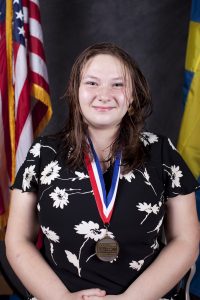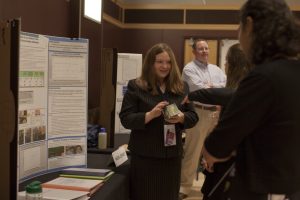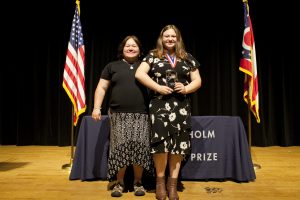
Sonja Michaluk, a junior at Hopewell Valley Central High School (Pennington, N.J.), was announced by the Water Environment Federation (WEF; Alexandria, Va.) as the winner of the 2019 U.S. Stockholm Junior Water Prize (SJWP) competition for the nation’s most promising young water researchers. She will present her research at the international SJWP competition, Aug. 25-30 in Stockholm, Sweden. Photo courtesy of Annelise Taggart.
Sonja Michaluk, a junior at Hopewell Valley Central High School (Pennington, N.J.), already boasts a career in water research that would be impressive for a scientist twice her age. And after the Water Environment Federation (WEF; Alexandria, Va.) announced last month that she will represent the U.S. at the 2019 Stockholm Junior Water Prize (SJWP) competition in August, Michaluk added another honor to her growing list of achievements.
According to her profile on WaterTank, a social network for SJWP competitors, Michaluk began presenting environmental data at scientific conferences by age 10. Her research into novel ways of using wildlife to measure waterway health has earned her a President’s Environmental Youth Award from the U.S. Environmental Protection Agency, a Grand Award at the Intel (Santa Clara, Calif.) International Science & Engineering Fair, and has influenced New Jersey construction and development regulations. In 2016, while still in middle school, the Massachusetts Institute of Technology (Cambridge) named a minor planet after her.
Michaluk’s winning project for SJWP, titled “A Novel Method of Monitoring the Health of our Global Fresh Water Supply using DNA Barcoding of Chironomidae (Diptera),” details how watershed conservation programs can use new molecular analysis techniques to better measure waterway health.
“Sonja’s project impressed the panel of national judges. She combined research with implementation to make a direct impact in her local water environment,” said Brad Lovett, who manages the U.S. SJWP program for WEF. “She is an excellent young scientist with a history of success and we are so excited for her to represent the U.S. in Stockholm.”
Drawing big conclusions from tiny organisms
Macroinvertebrates, spineless insects visible to the naked eye that often spend their entire lifespan in the same waterbody, make ideal reference points for water quality. Since they are often at the bottom of the food chain and appear in a wide range of climates, studying differences between macroinvertebrates of the same species can help scientists estimate how water quality conditions change over time and the effects those changes may have on larger organisms.

Michaluk’s winning research details a new waterway bioassessment method using macroinvertebrates in the Chironomidae family. She proposes a new methodology for identifying sample organisms more accurately than traditional approaches, as well as a new way to translate data from macroinvertebrate DNA to estimate waterway health. Photo courtesy of Annelise Taggart.
Current best practices for using living organisms to assess environmental health – a procedure known as bioassessment – were developed in 1977. Using the conventional bioassessment process, trained researchers can typically identify macroinvertebrates by family through simple observation. But determining genus and species, information that can enable more accurate comparisons between sample organisms, is a far more complex process, Michaluk writes. In previous studies, professional taxonomists have discovered bioassessment error rates of up to 65% using macroinvertebrates identified by the conventional approach.
Michaluk’s research focuses on members of the Chironomidae family, better known as non-biting midges, which are thought to be the most widespread macroinvertebrate on Earth. Michaluk devised a new sampling strategy to gather macroinvertebrate samples from 13 water bodies of varying elevations, sizes, and clarities. Of those samples, gathered over a 9-month period, Michaluk performed four different molecular analysis methods on individuals from the Chironomidae family in search of a more accurate and less expensive identification technique.
Michaluk obtained the best results from a method using silica resin and polymerase chain reaction beads, which amplified specific strands of DNA enough for her to identify individual species in 100% of tested samples.
By comparing the health of individuals of the same species extracted from different waterways, Michaluk’s study also proposes a new bioassessment methodology that can offer more information about pollutants, oxygen contents, and other water quality parameters.
“Sonja recognized the need to determine the health and quality of water systems. She understood that because the larvae of macroinvertebrates live within a small section of a particular waterway that if there are pollutants in that area, that the organisms will show a response,” said Jeanette Brown, head judge of the U.S. SJWP competition. “She showed a high level of understanding of scientific principles and the scientific method.”
All eyes on Stockholm
Michaluk is already working alongside New Jersey water researchers to apply her strategies to real-world waterway monitoring campaigns.

Sonja Michaluk (right), backed by her mother (left), receives the 2019 U.S. SJWP during the national competition, held June 13 to 16 at the Ohio State University (Columbus). Photo courtesy of Annelise Taggart.
“Beyond the impressive research Sonja performed in her study, she also applied her knowledge to a local non-profit water institute to improve her own community watershed,” said Austin Alexander, one of the judges for the U.S. SJWP competition representing Xylem Inc. (Rye Brook, N.Y.). “These students are creating solutions to improve communities across the world, and the SJWP is a testament to the importance of investing in the future of our industry.”
For winning at the national-level U.S. SJWP competition against other young researchers from 45 U.S. states and Puerto Rico, Michaluk earned $10,000 and an all-expenses-paid trip to Stockholm, Sweden. She will present her research during World Water Week, Aug. 25-30, alongside national winners from more than 30 countries.
If Michaluk wins the international competition, she will bring the SJWP back to the U.S., which was last won by American students Ryan Thorpe and Rachel Chang in 2017.
Read Michaluk’s full study on the WEF website.
— Justin Jacques, WEF Highlights








July 17, 2019
Featured